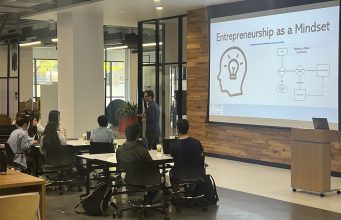As a team physician with the national governing body for USA Track & Field for over 20 years, R. Amadeus Mason MD knows what it means to be a leader in sports medicine for elite athletes. His specialty is non-operative orthopaedics.

Mason, assistant professor of orthopaedics and family medicine at Emory Healthcare, became medical director for USATF championship events in 2022. He coordinates medical coverage for USATF international teams, and national and local championship events.
In his new role, Mason now found himself leading medical operations, staffing, scheduling, budgeting, and human resources for all USATF championship events. However, nothing in medical school or his career had prepared him for this. Mason realized right away that to succeed in this new role, he would need the skills of an administrator.
“These kinds of directorship positions, especially for sporting entities, require a different set of skills. As I’ve progressed in my career, I haven’t had the opportunity to develop these skills,” he says. “Formalized training as a chief medical officer was something that I was lacking.”
Learning the Business of Healthcare
In November 2022, Mason enrolled in the first cohort of the Chief Medical Officer Program through Emory Executive Education. The program bridges clinical expertise and business acumen—filling an urgent need for medical practitioners who can lead in the C-suite.
Over nine to 12 months, the Chief Medical Officer program dives into the business of healthcare. Core modules cover health care leadership and business administration, team building, wellness, turning strategy into action, effective communication skills, DEI, and more. Electives in decision making and innovation provide further options.
For the core modules, participants watch weekly recorded lectures by faculty at a time convenient to them. They then gather online and over email to discuss the material as a group. Weekly online review sessions led by a teaching assistant offer a chance for students to further discuss the lecture material as a smaller group. Every other week, industry experts from around the globe give live online presentations. The presentations are followed by questions and comments with the cohort.
The elective in executive decision-making was particularly impactful. Mason says this course was exactly what he needed for his new role with USATF.
It was phenomenal. It really changed how I think and put things into practice.
R. Amadeus Mason
“I shared some of the things I was learning with my wife—who is a C-suite executive with degrees from Wharton and Kellogg—and she was impressed,” Mason says.
Practical Application: Reaching the Podium with Preventative Medicine
The core modules laid the foundation for Mason to develop the regional provider program at USATF. The goal was to provide injury prevention and mitigation. One of the biggest issues at USATF was that their elite athletes—potential medal winners—were showing up to high-stakes track meets nursing injuries.
With no protocol in place to stay on top of their elite athletes’ condition, Mason says, “we were leaving potential medals on the table.” Athletes had injuries that prevented them from performing at their best or at all—injuries that should have been identified and treated earlier.
Even though USATF is the national governing body for track and field, creating a program for injury surveillance, treatment, and prevention for their elite athlete population was a big task. Athletes live and train all over the country. Many potential medalists are still in college, and their schools conduct their own injury surveillance, treatment, and prevention. On top of all that, the more than 40 different disciplines within USATF all have vastly different support needs.
USATF’s solution was to establish the regional medical provider program, a network of athletic trainers based in areas with a high concentration of USATF athletes. They travel to and regularly touch base with athletes in their region. This provides comprehensive yet specialized medical coverage for eligible athletes. Regular visits foster trust and familiarity, increasing the likelihood that athletes and coaches will use the medical services.
The regional medical providers report to a physician with oversight duties. That physician orders and reviews imaging studies and labs as indicated, arranges consultations, and visits training camps to do sports medicine wellness checks. The program also leverages relationships with local and regional medical systems.
Putting New Tools to the Test
“I used the tools I learned in the Chief Medical Officer Program to think about and implement this program,” Mason says. “We had to make decisions about how the system would be set up and how it would be executed. Then we had to share it with the athletes and coaches and get their buy-in.”
The regional medical provider program was in place leading up to the World Championships last June, Mason notes, and Team USA was healthier than ever and performed better than it ever has in Europe.
Mason says he gained tools that help him communicate with more presence and clarity while in the Chief Medical Officer Program, which, as a result, have improved his decision making.
“The program has given me a lot more confidence as a communicator,” he says. “The way in which I communicate and I write emails has really changed. When I put out a request, I’m being a lot more intentional, a lot more available, and also a lot more in a hearing mode, so I can hear what is going on and incorporate that into my thinking moving forward, as opposed to trying to come up with things on my own.”
Mason says that others in his CMO program cohort reported similar results as they put theories learned into practice. He has already recommended the program to other physicians.
The program would benefit anyone seeking to lead effectively in health care, whether on a committee or in a division, department, or hospital system.
R. Amadeus Mason
“I was able to immediately and directly apply things we covered in the modules,” he says. “It made things so much easier.”
Are you a medical professional looking to level up your leadership skills? Learn how the Chief Medical Officer Program from Emory Executive Education can prepare you to advance your career and maximize your impact from the C-suite.











